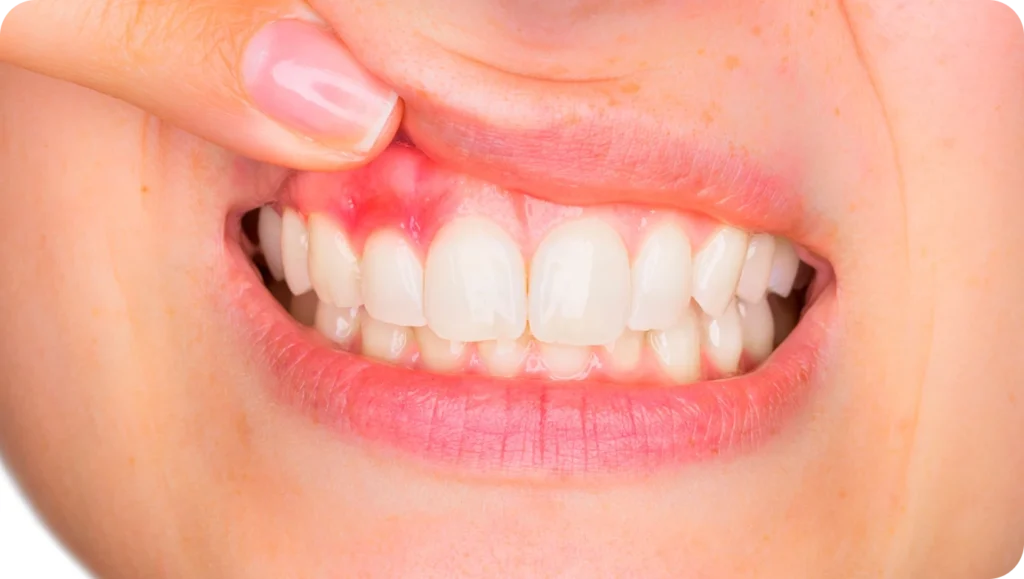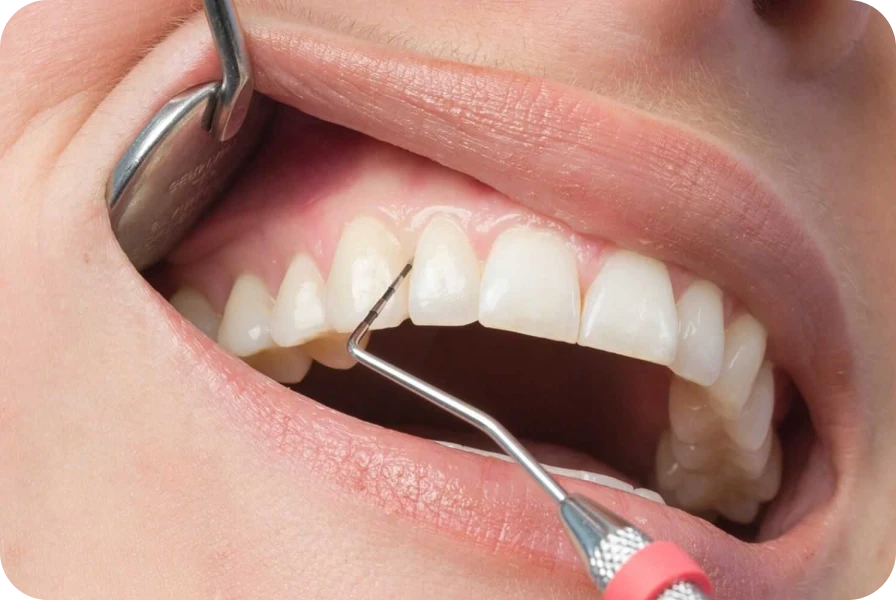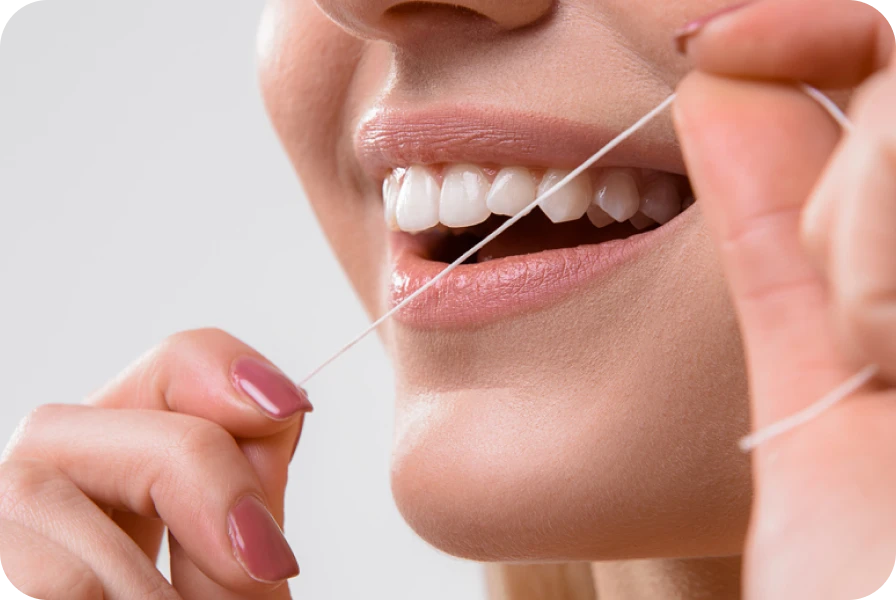Gingivitis
Gingivitis: Effective Prevention and Treatment
Understanding Gingivitis
Gingivitis is an inflammation of the gums caused by dental plaque. This plaque is a film of bacteria that constantly forms on the teeth. It is essential to thoroughly understand the causes and consequences of gingivitis to better prevent and treat it.
Be attentive to the signs of gingivitis. The most common symptoms include red, swollen, and sensitive gums. You may also notice gum bleeding during brushing or flossing. If these symptoms appear, it is crucial to act quickly to prevent gingivitis from worsening.

- Adopt good oral hygiene: to prevent gingivitis, adopt a rigorous oral hygiene routine. Brush your teeth twice a day for two minutes with fluoride toothpaste. Use a soft-bristled toothbrush to avoid damaging your gums. Change your toothbrush every three months or as soon as the bristles are worn.
- Antiseptic mouthwashes help reduce bacteria responsible for gingivitis. Use a mouthwash after brushing and flossing. This enhances the effectiveness of your oral care routine.
- Sugar is a favorite food for bacteria that cause dental plaque. Limit your consumption of sugary drinks, candies, and other sugar-rich foods. If you consume sugar, brush your teeth or rinse your mouth immediately afterward.
- Smoking is a major risk factor for gingivitis. Tobacco weakens the immune system and makes gums more vulnerable to infections. If you smoke, it is strongly recommended to quit to preserve your gum health.
Consult your Dentist Regularly
Regular dental visits are essential for preventing and treating gingivitis.
Schedule a check-up every six months for a professional cleaning. This allows for the removal of accumulated dental plaque and the detection of early signs of gingivitis.
If you detect the first signs of gingivitis, act immediately. Increase the frequency of your oral care and use an antibacterial mouthwash.
Consult your dentist for professional treatment if symptoms persist.

- A balanced diet rich in vitamins and minerals strengthens the gums. Consume foods rich in vitamin C, such as citrus fruits and green vegetables. Vitamin C helps repair gum tissues and prevent inflammation.
- Stress can weaken your immune system and increase the risk of gingivitis. Take steps to manage your stress, such as meditation, yoga, or physical exercise. A relaxed mind contributes to maintaining healthy gums.
- Alcohol and acidic beverages can irritate the gums and contribute to dental plaque accumulation. Limit your consumption of these beverages and prioritize water and fresh, unsweetened fruit juices. This helps protect your gums and prevent gingivitis.
- Hormonal changes, such as those related to pregnancy or menopause, can make gums more sensitive. If you are experiencing a period of hormonal changes, be particularly vigilant about your oral hygiene. Consult your dentist for tailored advice.
- Certain substances can irritate the gums, such as dental products containing alcohol or fragrances. Prioritize gentle, alcohol-free products for your oral hygiene. This limits the risks of irritation and the development of gingivitis.
- Certain medications can have side effects on the gums, such as dry mouth or gingival hyperplasia. If you are taking medications, inform your dentist. They can advise you on the best practices to minimize these side effects.
- Electric toothbrushes are more effective at removing dental plaque, especially in hard-to-reach areas. Choose an electric toothbrush with a rotating and oscillating head. This helps prevent gingivitis by cleaning more thoroughly.
- Daily flossing is essential for removing dental plaque between teeth and below the gumline. Gently slide the floss between each tooth, forming a “C” shape around the tooth. This action allows for effective cleaning without damaging the gums.
Hydrate Regularly
Good hydration is essential for gum health. Water helps maintain adequate moisture levels in the mouth and remove food debris. Drink water throughout the day to prevent dry mouth, which can promote gingivitis.
Practice Oral Exercises
Oral exercises, such as gum massage, can improve blood circulation and strengthen gingival tissues. Use your fingers to gently massage your gums in circular motions. This stimulates the gums and helps prevent inflammation.
Adopt a Fiber-Rich Diet
Fiber-rich foods, such as crunchy fruits and vegetables, help clean teeth and gums. Fiber acts as a natural brush, removing dental plaque and stimulating the gums. Incorporate fiber-rich foods into your daily diet.
Avoid Frequent Snacking
Constant snacking increases the risk of dental plaque and gingivitis. If you need to eat between meals, choose healthy foods such as fruits or vegetables. Avoid sugary or acidic snacks that can harm the health of your gums.

Clean your tongue
The tongue can harbor bacteria responsible for dental plaque. Clean your tongue daily using a tongue scraper or your toothbrush. This action helps reduce bacteria in the mouth and prevent gingivitis.
Care for Dental Prostheses
If you wear dental prostheses, ensure they are well-fitted. Ill-fitting prostheses can irritate the gums and promote gingivitis. Clean your prostheses regularly and consult your dentist if you experience discomfort.
Adjust your Care for Chronic Conditions
Chronic diseases, such as diabetes, can increase the risk of gingivitis. If you have a chronic disease, meticulously follow your dentist’s recommendations to prevent gingivitis. Rigorous management of your oral health is essential.
Exercise Caution after Oral Surgery
After oral surgery, your gums may be more sensitive and prone to gingivitis. Follow your dentist’s post-operative instructions to avoid infections. Adapt your oral care routine to promote rapid healing and prevent gingivitis.
Promote a Healthy Oral Environment
Maintaining a healthy oral environment is crucial for preventing gingivitis. Ensure proper mouth ventilation by breathing through your nose. Good aeration helps reduce dry mouth and prevent dental plaque accumulation.
Avoid Sharp or Abrasive Objects
Never use sharp or abrasive objects to clean your teeth or gums. These objects can damage the gums and promote the development of gingivitis. Use only approved and gentle dental tools to care for your gums.
Promote a Healthy Lifestyle
A healthy lifestyle, including a balanced diet and regular physical activity, contributes to gum health. Exercise helps strengthen the immune system and reduce inflammation, which is beneficial for preventing gingivitis.
Maintain a Consistent Care Routine
The key to preventing gingivitis is to maintain a regular and rigorous oral care routine. Do not wait for symptoms to appear to care for your gums. Be proactive and adopt strict daily oral hygiene.
Communicate with your Dentist
If you have concerns regarding your gum health, communicate with your dentist. Do not allow minor issues to escalate into gingivitis. Open dialogue with your dentist is essential for maintaining healthy gums and preventing complications.
Care for your Gums Daily
Gums are an essential part of your oral health. Care for them daily by following your dentist’s recommendations and adopting exemplary oral hygiene. By taking these measures, you can prevent gingivitis and maintain healthy gums for life.
